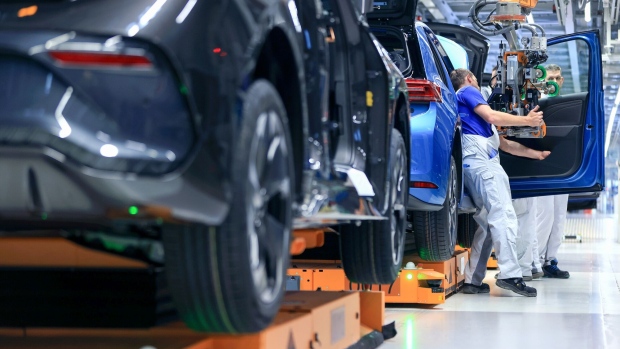Dec 6, 2023
Volkswagen Labor Official Sees Deal on Savings Plan Within Weeks
, Bloomberg News

(Bloomberg) -- Volkswagen AG’s works council expects to strike a deal with management on the carmaker’s planned savings push before the end of this month.
Europe’s biggest automaker is preparing a program to lift returns at its namesake brand and better compete with rivals such as Stellantis NV and Tesla Inc., with wilting demand in Europe and China adding urgency to efforts to slim down bloated structures.
“We want to have finalized the key points by the end of the year,” works council chief Daniela Cavallo told employees at a meeting in Wolfsburg on Wednesday, according to an internal message seen by Bloomberg. “I’m very confident that we will succeed.”
Chief Executive Officer Oliver Blume wants the long-struggling VW brand to deliver a sustained gain in earnings of about €10 billion ($10.8 billion) by 2026 and a margin of 6.5%, up from 3.6% last year.
The future success of the nameplate depends in large part on its ability to deliver models that are attractive and competitive, Cavallo said. Volkswagen has struggled to deliver a robust lineup of EVs in an increasingly competitive market, with repeated stumbles at its software unit Cariad delaying key Porsche and Audi models.
Read more: VW Tells Workers to Brace for Job Cuts in Savings Push
Management has already decided on measures including cutting product costs, streamlining customer service and limiting model options and trims. Volkswagen’s personnel chief, Gunar Killian, said administrative staffing costs will need to be cut by a fifth and that the carmaker would maximize partial and early retirement offers.
“We will need to operate with fewer people in many areas at Volkswagen in the future,” VW brand CEO Thomas Schäfer said at the meeting. “We want VW to be the world’s leading volume brand again.”
Labor representatives and officials representing the state of Lower Saxony hold more than half of the seats on Volkswagen’s supervisory board, meaning their backing is needed for key strategic decisions including job cuts and factory closures.
Inflationary pressures, disappearing subsidies and uncertainty about the shift to electric vehicles has resulted in lower-than-expected demand in Volkswagen’s home market. The main Wolfsburg factory is on track to make fewer than 500,000 vehicles this year, well below its pre-pandemic average.
(Updates with details on savings plan starting in the fourth paragraph.)
©2023 Bloomberg L.P.

